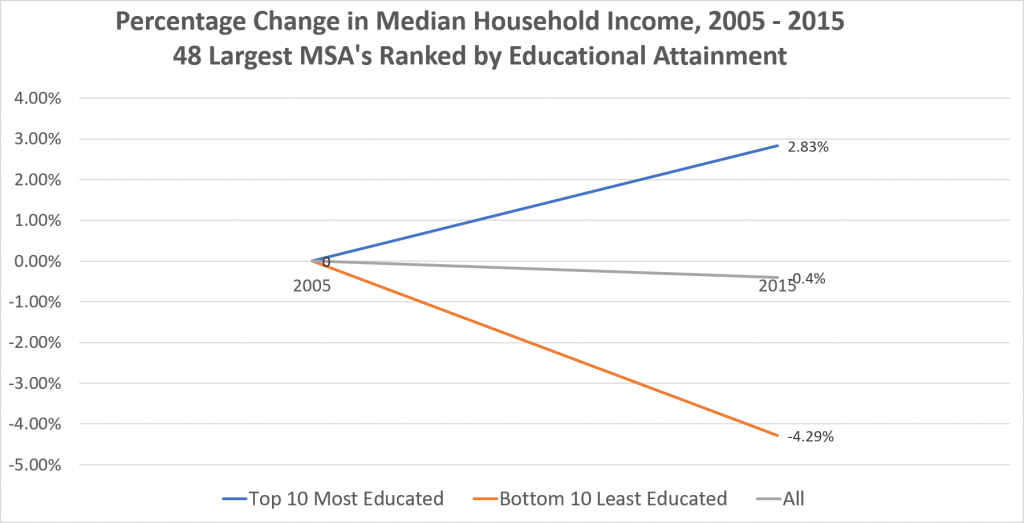If our work across the country has taught us anything, it is that a region’s people are its number one asset; the skills and abilities of a region’s population are the currency that propels growth. The readiness of an area’s workforce to take on new challenges and drive the economy forward is often measured by their percentage of college degree attainment and indeed countless analyses tell a story of separation between more-educated workers and places and those that are less-educated. We recently analyzed the largest 48 US Metropolitan Statistical Areas’ percentage of people with a bachelor’s degree or higher, and their corresponding median household income and found those places with the highest attainment increased their average household income between 2005 and 2015 while those MSA’s with the lowest attainment saw a decrease in their incomes during the same time frame.

While the gravitational pull of high degree attainment cannot be denied, it doesn’t tell the whole story of the skills a region’s workers have. Indeed, even in the highest attaining MSA’s (anchored by Washington DC and San Jose) only 49% of the population over 18 has at least a bachelor’s degree. Despite this, in a recent Rockefeller Foundation study that surveyed 201 c-suite and hr professionals, 69% indicated their company uses a college degree as the primary screening criteria for entry-level jobs. The study also found that hiring based on college degree attainment often leads to hiring and retention challenges due to a smaller talent pool and employees who feel overqualified for their jobs. Here in Northeast Ohio, we are trying a new approach, skills-based hiring.
What is most important in hiring is matching the requirements to do the job and an individual’s measurable skill set, and skills-based hiring practices are showing educational attainment isn’t the only way to measure someone’s skills. The required skills may also be gauged through validated competency assessments, such as ACT’s WorkKeys. Research has shown when employers use this approach, they find a reduction in turnover, time-to-hire, cost-to-train, and time-to-train. TalentNEO is a regional effort lead by Towards Employment that is supported by a cross-section of Northeast Ohio’s businesses, workforce development organizations, community colleges and public agencies, among others, working to demonstrate that when employers use ACT WorkKeys ‘skill scores’ as part of their hiring process, the size of the talent pool increases, leading to an increase in retention and a reduction in costs.
Skills-based hiring not only helps companies, it also helps communities. Through expanding the talent-pool, those who have the skills needed, but lack the education credentials traditionally used to screen applicants, are able to access career pathways to more stable and better paying jobs. For those who need to improve their scores, many communities using skill-based hiring offer programs to help applicants. In Northeast Ohio, both the WorkKeys assessment and the aligned upskilling training, KeyTrain, are offered at no cost to residents. Additionally, for those occupations for which specific technical training is needed (CNC operators, computer programmers, etc.) some training providers are beginning to accept skill scores for admissions, in lieu of entrance exams.
Increasing educational attainment and skill-based hiring are just some of the tools a community should have in their toolbox for economics and workforce development. Sign up for our newsletter to learn more about the projects we are working on to help communities think through these challenges.

